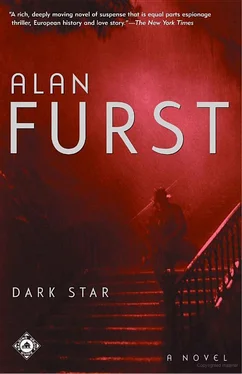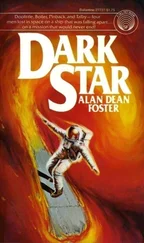Alan Furst - Dark Star
Здесь есть возможность читать онлайн «Alan Furst - Dark Star» весь текст электронной книги совершенно бесплатно (целиком полную версию без сокращений). В некоторых случаях можно слушать аудио, скачать через торрент в формате fb2 и присутствует краткое содержание. Жанр: Шпионский детектив, на английском языке. Описание произведения, (предисловие) а так же отзывы посетителей доступны на портале библиотеки ЛибКат.
- Название:Dark Star
- Автор:
- Жанр:
- Год:неизвестен
- ISBN:нет данных
- Рейтинг книги:3 / 5. Голосов: 1
-
Избранное:Добавить в избранное
- Отзывы:
-
Ваша оценка:
- 60
- 1
- 2
- 3
- 4
- 5
Dark Star: краткое содержание, описание и аннотация
Предлагаем к чтению аннотацию, описание, краткое содержание или предисловие (зависит от того, что написал сам автор книги «Dark Star»). Если вы не нашли необходимую информацию о книге — напишите в комментариях, мы постараемся отыскать её.
Dark Star — читать онлайн бесплатно полную книгу (весь текст) целиком
Ниже представлен текст книги, разбитый по страницам. Система сохранения места последней прочитанной страницы, позволяет с удобством читать онлайн бесплатно книгу «Dark Star», без необходимости каждый раз заново искать на чём Вы остановились. Поставьте закладку, и сможете в любой момент перейти на страницу, на которой закончили чтение.
Интервал:
Закладка:
“His thinking is very broad,” Dershani said. “We are not meant to understand it. We are not meant to comment upon it.” He paused for coffee, to permit the atmosphere in the room to rise to his level, then took a few pine nuts. “These are delicious,” he said. “If you look at our history-the history of our service, I mean-his hand may be seen to have grasped the tiller just at the crucial moment. We began with Dzerzhinsky, a Pole of aristocratic background from Vilna. Catholic by birth, he shows, early in life, a great affection for Jews. He comes to speak perfect Yiddish, his first lover is one Julia Goldman, the sister of his best friend. She dies of tuberculosis, in Switzerland, where he had placed her in a sanatorium, and his sorrow is soothed by a love affair with a comrade called Sabina Feinstein. Eventually he marries a Polish Jewess, from the Warsaw intelligentsia, named Sophie Mushkat. His deputy, the man he depends on, is Unshlikht, also a Polish Jew, also an intellectual, from Mlawa.
“When Dzerzhinsky dies, his other deputy, Menzhinsky, takes over. No Jew, Menzhinsky, but an artiste. A man who speaks Chinese, Persian, Japanese, in all twelve languages and who, while doing our work in Paris, is a poet one day, a painter the next, and lies around in silk pajamas, smoking a perfumed cigarette in an ivory holder, the leader of a, a salon. Lenin dies. This young state, troubled, gravely threatened, thrusts itself at our leader, and he agrees to take its burdens upon his shoulders. He seeks only to continue the work of Lenin but, in 1934, the Trotskyite center begins to gather power. Something must be done. In Lenin’s tradition he turns to Yagoda, a Polish Jew from Lodz, a poisoner, who eliminates the writer Gorky through seemingly natural means. But he is too clever, keeps his own counsel, and by 1936 he is no longer the right sort of person for the job. Now what is the answer? Perhaps the dwarf, Yezhov, called familiarly ‘the blackberry,’ which his name suggests. But this one is no better than the other-not a Jew this time but a madman, truly, and malicious, like a child of the slum who soaks cats’ tails in paraffin and sets them alight.”
Dershani stopped dead, tapping four fingers on the kitchen table. A glance at Agayan’s wife, standing at the stove in the far part of the kitchen, brought her swiftly with a fresh little cup of coffee.
“Tell us, Efim Aleksandrovich, what will happen next? ” Ismailov thus declared himself suitably chastened, symbolically sought Dershani’s pardon for his momentary flippancy.
Dershani closed his eyes politely as he drank off his coffee, smacked his lips politely in appreciation. “Stasia Marievna, you are a jewel,” he said. She nodded silently to acknowledge the compliment.
“It evolves, it evolves,” Dershani said. “It is beautiful history, after all, and guided now by genius. But he must move at the proper speed, certain matters must be allowed to play themselves out. And, I tell you in confidence, there are many considerations that may elude our vision. These yidzh from Poland cannot just be swept away wholesale. Such cleaning, no matter how appropriate, would draw unwelcome attention, might alienate the Jews of America, for instance, who are great idealists and do our special work in their country. Thus Russians and Ukrainians, yes, and even Georgians and Armenians must leave the stage along with the others. This is necessity, historical necessity, a stratagem worthy of Lenin.”
“Then tell us, Efim Aleksandrovich,” said Agayan, not unconsciously echoing Ismailov’s phrasing, “if today we are not in fact privileged to hear the views of our comrade in Tbilisi? ” He referred to Lavrenty Pavlovich Beria, presently first secretary of the Georgian Communist party and previously head of the Georgian NKVD. The modest bite in the question suggested that Dershani should perhaps not call his wife a jewel in front of his colleagues.
Dershani took only the smallest step backward. “Lavrenty Pavlovich might not disagree with the drift of what I am saying. We both believe, I can say, that we will win this battle-though there are actions which must be taken if we intend to do so. Most important, however, to perceive his, his, wishes and to act upon them with all possible measures.”
This opened a door. Agayan tapped his cup on the saucer and his wife brought him a fresh coffee. Dershani had cited all possible measures, and form now decreed that Agayan seek to discover what they were. Once described, they had to be undertaken.
Dershani glanced at his watch. Agayan leapt at the possibility. “Please, Efim Aleksandrovich, do not permit us to detain you if duty calls elsewhere.”
“No, no,” Dershani said dismissively, “I’m simply wondering what’s become of Grigory Petrovich-he was specifically to join us this morning.”
“You refer to Khelidze?” Ismailov asked.
“Yes.”
“I’ll call his apartment,” Agayan said, rising quickly, delighted with the interruption. “His wife will know where he’s gotten to.”
Dzakhalev snickered briefly. “Not likely,” he said.
Monday morning, striding through a fine, wet mist that made the streets of Prague even grayer than usual, Szara went early to the SovPressBuro, which handled all Soviet dispatches, and filed the story he’d written on Saturday night. It had taken him some twenty-eight tries to get a title that settled properly on the piece. His initial instinct led down a path marked “Prague, City in — .” He tried “Peril,” “Sorrow,” “Waiting,” “Despair,” and, at last, in fury that it wouldn’t work, “Czechoslovakia.”
At the end of patience the rather literal “Silence in Prague” took the prize, a title, on reflection, that turned out to be a message from the deep interior where all the work really went on. For those who read with both eyes, the melodramatic heading would imply a subtle alteration of preposition, so that the sharper and truer message would concern silence about Prague-not the anguished silence of a city under political siege but the cowardly silence of European statesmen, a silence filled with diplomatic bluster that nobody took seriously, a silence that could be broken only by the sputter of tank ignitions as armored columns moved to reposition themselves on the borders of Germany.
There was, in fact, another zone of silence on the subject of Prague, to the east of Czechoslovakia, where Stalin’s Franco-Russian alliance specified that the USSR would come to the aid of the Czechs if Hitler attacked them, but only after the French did. Thus the USSR had positioned itself to hide behind the promises of a regime in Paris that compromised on every issue and staggered from scandal to catastrophe and back again. Yes, Stalin’s Red Army was in bloody disarray from the purges of June ‘37, but it was sorrowful, Szara thought, that the Czechs would get the bill for that.
And there was, unknown to Szara, some further silence to come.
The dispatch clerk at the bureau near the Jiraskuv bridge, a stern, full-breasted matron with mounds of pinned-up gray hair, read “Silence in Prague” sitting in front of her typewriter. “Yes, comrade Szara,” she breathed, “you have told the truth here, this is just the way this city feels.” He accepted the compliment, and more than a little adoration in her eyes, with a deflective mumble. It wouldn’t do to let her know just how much such praise meant to him. He saw the story off, then wandered along the streets that ran next to the Vltava and watched the barges moving slowly up the steel-colored November river.
Szara returned to the press bureau on Tuesday morning, meaning to wire Moscow his intention to travel up to Paris. There was always a story to be found in Paris, and he badly needed to breathe the unhealthy, healing air of that city. What he got instead, as he came through the door, was a pitying stare from the maternal transmission clerk. “A message for the comrade,” she said, shaking her head in sympathy. She handed him a telegram, in from Moscow an hour earlier:
Читать дальшеИнтервал:
Закладка:
Похожие книги на «Dark Star»
Представляем Вашему вниманию похожие книги на «Dark Star» списком для выбора. Мы отобрали схожую по названию и смыслу литературу в надежде предоставить читателям больше вариантов отыскать новые, интересные, ещё непрочитанные произведения.
Обсуждение, отзывы о книге «Dark Star» и просто собственные мнения читателей. Оставьте ваши комментарии, напишите, что Вы думаете о произведении, его смысле или главных героях. Укажите что конкретно понравилось, а что нет, и почему Вы так считаете.












